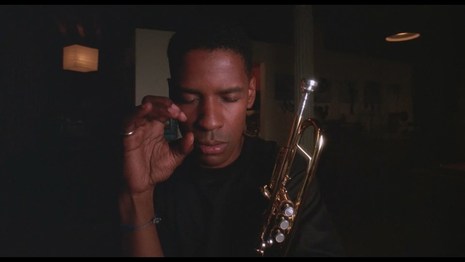C+ | A dedicated jazz musician juggles his incompetent manager and two girlfriends. Directed by Spike Lee Starring Denzel Washington and Spike Lee Initial Review by Jon Kissel |

Giant is Lee’s worst flaw in Mo’ Better Blues, but the script is close behind, especially through the lens of this exact moment right now. This is a misogynist film. At least School Daze felt bad when it humiliated Giancarlo Esposito’s girlfriend. Butterbean’s (Robin Harris) act is about how much he loves ugly women, because he can walk all over them. No jokes, just a reenacting of a sad conversation. Left’s girlfriend is a subject of fun because… she’s French and isn’t intimidated by these guys. Indigo (Joie Lee) and Clarke (Cynda Williams) only exist in relation to who in the band they’re doing the Mo’ Better with (credit where it’s due, that a good line). The happy ending, based on Bleek looming over Indigo in her giant home on a teacher’s salary and turning her many no’s into a yes, is gross and hacky, like Lee ran out of inspiration and needed to fill five minutes.
If Lee needed Bleek to get married and have a kid with one of the two women (flip a coin, it doesn’t matter which) because he wanted those bookends on his film, he should’ve made a film that reflected the intro scene. Bleek doesn’t lose his musical career because he cares too much about his music: he loses it because he starts to care about other things. He throws Shadow (Wesley Snipes) out because he’s been sleeping with Clarke, and he loses his ability thanks to his loyalty to Giant. Clarke isn’t written well enough to make Bleek’s jealousy potent, and we’ve already talked about how terrible Giant is. If he focused on the music, like his mom told him, he would’ve continued on as a successful musician. By letting his own son go play and cut practice short, maybe Bleek Jr never puts in the necessary hours to become great.
To go with how dismissive Lee is of his female characters, he throws in some aggressive anti-Semitism with the Flatbushes (John and Nicholas Turturro). To quote Popstar: Never Stop Never Stopping, they look like Nazi propaganda. In an interview I read, Lee tries to excuse this by talking about Jewish manipulation of black artists, which is certainly true, but then he goes too far and who cares, they’re only in the film for a short period of time and it’s not like black people haven’t been caricatured on film before. The Sopranos had a similar character in Hesh Rabkin, a retired music producer who got rich off of black artists, and he wasn’t portrayed as a stereotype. Lee can evoke decades of exploitation while making the Flatbushes into realistic characters who don’t renegotiate contracts (Giant, again, being a sack of shit), but he chooses not to.
Holding the edifice up is Denzel, and he makes it looks easy. Everything good or even great about Mo’ Better Blues is in his performance, or adjacent to it. The scene of Bleek practicing is flawless, a peak into process that makes musical talent knowable, less as something innate and more as the result of endless hours of physical and mental practice. Part of that scene is a Full Metal Jacket-esque disassembling, cleaning, and reassembling of his trumpet, a piece of machinery finely tailored to Bleek’s exacting specifications. There are many like it, but this one is his. This is the kind of style that Lee is capable of in one of his better films. Denzel plays Bleek like I imagine Denzel to be in real life: stoic, dismissive of other people, supremely confident in his abilities. He’s therefore not reaching, in my opinion, as this is a performance where objective #1 is to be a credible musician, but when you’re Denzel, not reaching still gets you to a strong place, if not a great one.
Spike Lee’s a frustrating and wildly uneven director, and Mo’ Better Blues is both of those. This was made in the shadow of Lee’s masterpiece, Do the Right Thing, and it’s like this and that were directed by two different people. Do the Right Thing fundamentally has respect for all its characters, while Mo’ Better Blues forgets to make the majority compelling individuals. Do the Right Thing even has a competent Lee performance in it, though again, I don’t know why he insists on playing such big roles. Mo’ Better Blues seems like an afterthought, like Lee expended so much creative brilliance on Do the Right Thing, that there was only enough for the aforementioned training montage here. Lee continues his downward MMC spiral, as Mo’ Better Blues gets a C. Next one we pick has to break the cycle.
 RSS Feed
RSS Feed